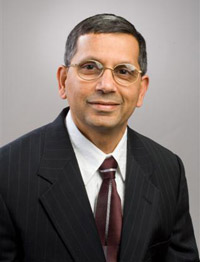Professor Kattesh V. Katti
The KurzweilAI.net article “Green” method to make gold nanoparticles said
“University of Missouri scientist Kattesh Katti has discovered how to make gold nanoparticles using gold salts, soybeans, and water — an alternative to production methods using toxic chemicals.The new process could allow medical researchers to expand the use of gold nanoparticles for drug delivery and other purposes.”
Kattesh V. Katti, MSc.Ed, PhD, DSc, FRSC, FNAI is Curator’s Professor of Radiology and Physics; Margaret Proctor Mulligan Distinguished Professor of Medical Research; and Director, University of Missouri Cancer Nanotechnology Platform, University of Missouri. He was awarded with the Albert Nelson Marquis Lifetime Achievement Award by Marquis Who’s Who in 2019. He was selected to be one of “25 Most Influential in Molecular Imaging” in the world in 2008.
Kattesh has launched the International Journal of Green Nanotechnology. This is the first journal to focus specifically on the crucial scientific, engineering, industrial, and logistical challenges of developing green nanotechnologies for applications in medicine, materials science, environmental science, and alternate energy production.
“Agricultural and medical sciences must connect with emerging areas of science and technology; the International Journal of Green Nanotechnology, edited by Professor Kattesh V. Katti, would be a means of establishing this important connection between nanotechnology and green science.” — Dr. Norman Ernest Borlaug, humanitarian, and Nobel Laureate.
In 2007, Kattesh was awarded the coveted 2007 Outstanding St. Louis Scientist Fellows Award by the Academy of Science of St. Louis which is one of the most prestigious and oldest science Academies of the world. The Academy’s literature called it “a rare feat to be distinguished in Chemistry, Physics, materials science, and Biomedicine — all of these fields simultaneously” and praised his discoveries in the development of gold and silver nanoparticles for applications in nanomedicine.
In 2006, he was awarded the 2006 Gauss Professorship Award from the Academy of Sciences, Gottingen, Germany. He is the fourth US scientist to receive this highly prestigious international award. His research was cited by the President of India in his Inaugural Speech at the Global Nanoscience Initiatives on March 16, 2006 in New Delhi, India.
His research areas are Nanoscience and Nanotechnology in Nanomedicine, Metals/Organomatallics In the Development of Cancer Diagnostic and Therapeutic Agents, Biomedical Optical Imaging, New Approaches to Cancer Therapy, New Biomaterials for use in Surgical and Non-surgical Wound Healing applications, and Fundamental Aspects of Structure of Water and Water-Alcohol Binary Mixtures.
Kattesh coauthored Facile and general method for synthesis of sugar coated gold nanoparticles, Green nanotechnology from tea: phytochemicals in tea as building blocks for production of biocompatible gold nanoparticles, Biodistribution of maltose and gum arabic hybrid gold nanoparticles after intravenous injection in juvenile swine, Gastrin releasing protein receptor specific gold nanorods: breast and prostate tumor avid nanovectors for molecular imaging, Green nanotechnology from cumin phytochemicals: generation of biocompatible gold nanoparticles, and Soybeans as a phytochemical reservoir for the production and stabilization of biocompatible gold nanoparticles. Read the full list of his publications!
His patents include Hydroxymethyl phosphine compounds for use as diagnostic and therapeutic pharmaceuticals and method of making same, Conjugate and method for forming aminomethyl phosphorus conjugates, New multifunctional ligands for potential use in the design therapeutic or diagnostic radiopharmaceutical imaging agents, Multifunctional ligand for use as a diagnostic or therapeutic pharmaceutical, Method for treating liquid wastes, and Carbonylation of methanol using a novel transition metal catalyst. Read the full list of his patents!
Kattesh earned his B.S. in Chemistry from Karnatak University, India in 1977, his M.S.Ed. from the Regional College of Education, Mysore, India in 1979, and his Ph.D. from the Indian Institute of Science, Bangalore, India in 1984. In 2009, he was bestowed with the highly coveted Doctor of Science (DSc) Honoris Causa by Karnataka University, India, in recognition of his contributions to nanoscience, nanomedicine, green nanotechnology and its application to medical and environmental research. In 2012, he was elected a fellow of the American Association for the Advancement of Science (AAAS).
Read Breakthroughs in Nanotechnology on Edge of “Knowledge Frontier” MU scientist’s nanotech research earns him “Outstanding Missourian” award, Common Ingredient in Big Macs and Sodas Can Stabilize Gold Nanoparticles for Medical Use, and Researcher Develops New Drug for Wilson’s Disease Patients.
